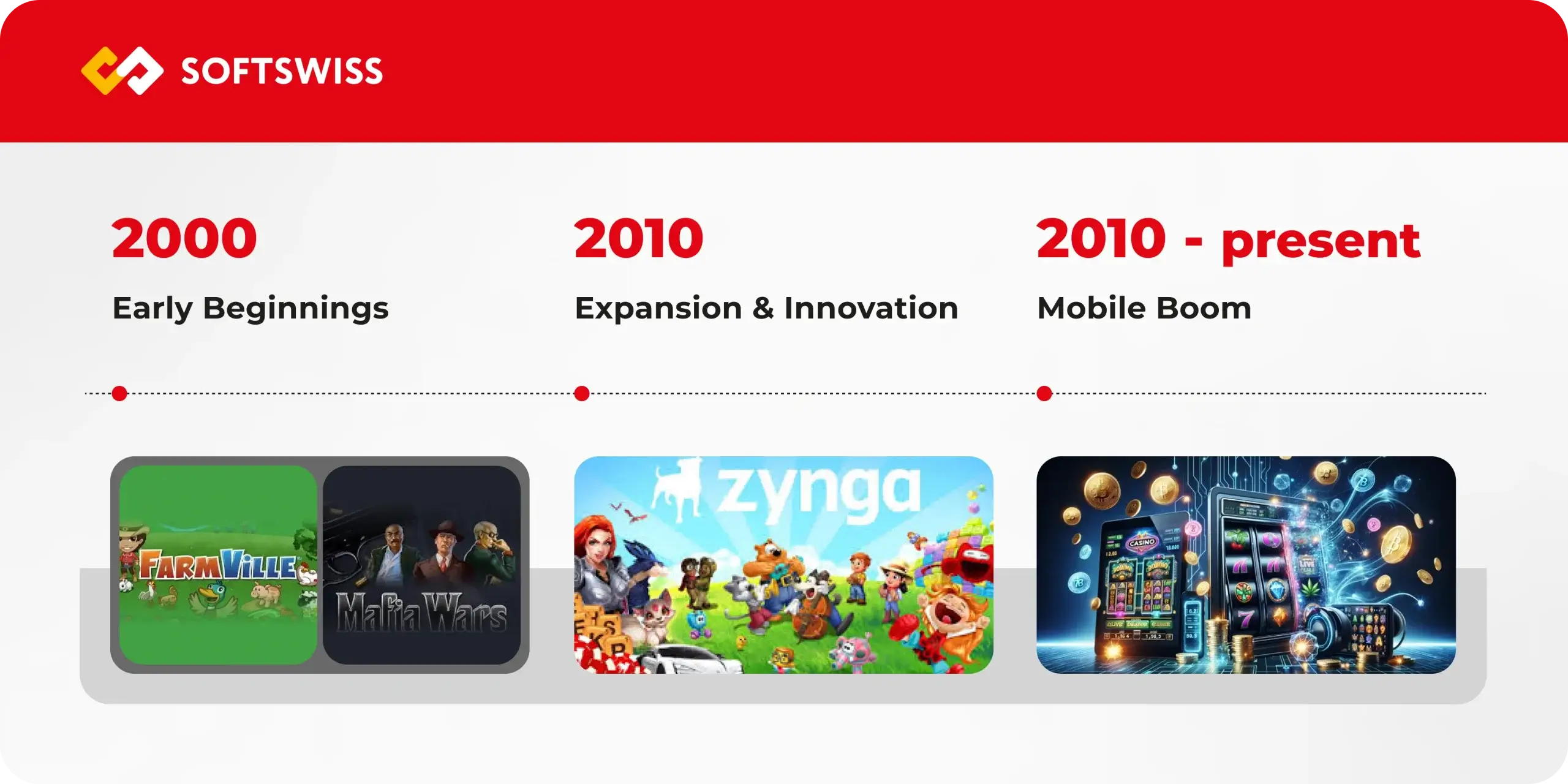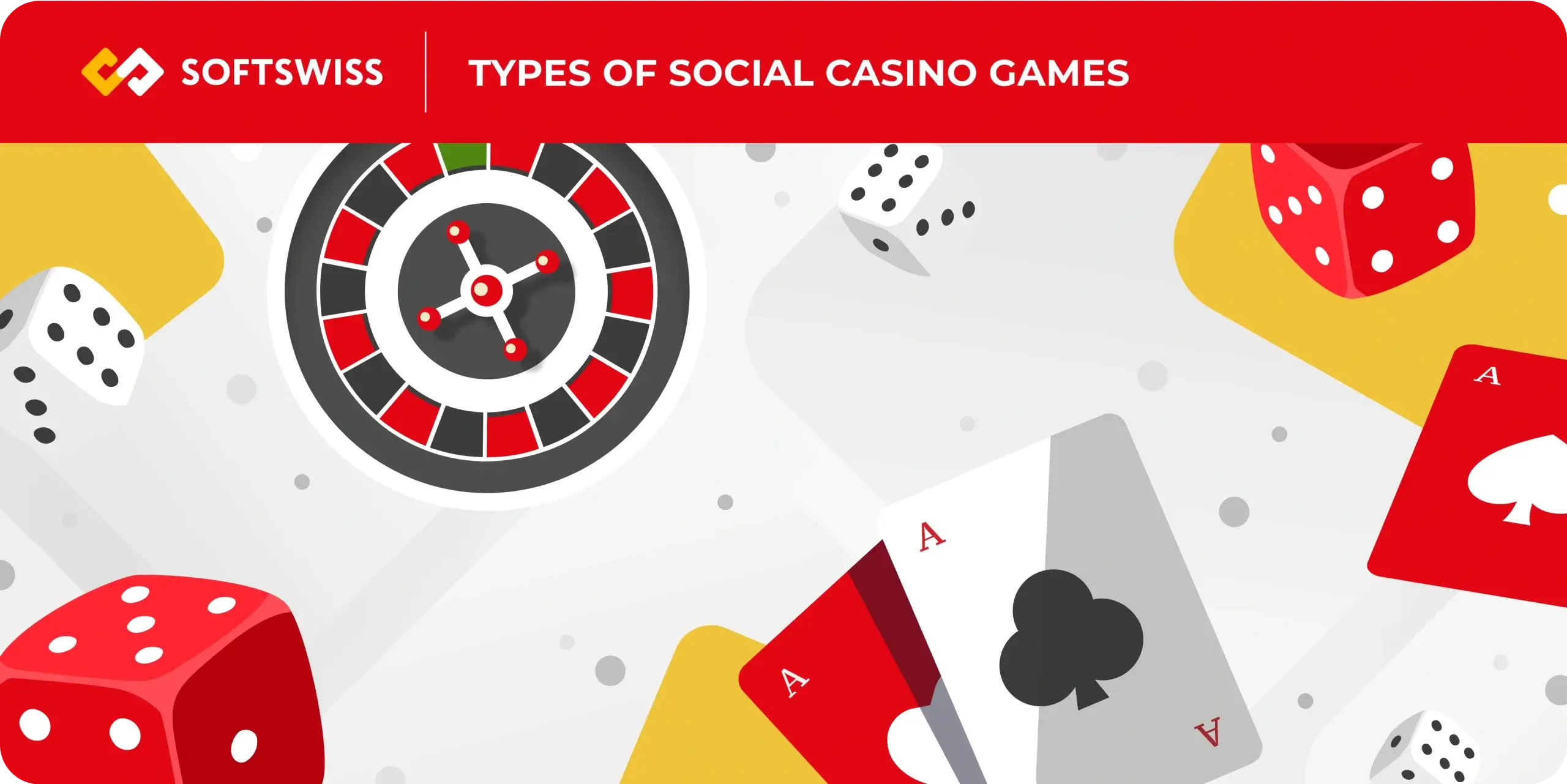According to Bv1sion, the global gross gaming revenue (GGR) of the social casino segment reached 6.2 billion U.S. dollars in 2020 and is expected to climb to 7.5 billion U.S. dollars by 2026, therefore consolidating social iGaming as a promising field in the sector.
This article aims to deepen the concept of social casinos, providing answers to the most common questions regarding the play-money gaming sector. Here, we will highlight their inception, key features, evolution, and the manifold benefits they offer to real-money casino operators.
By the end of this article, readers will better understand social casinos, how social gaming has evolved into social iGaming, and the strategic benefits they bring to the table for iGaming business owners.
What is a Social Casino?
A social casino allows players to engage in casino-style games, such as slots, poker, and bingo, using virtual currency instead of real money.
Unlike online casinos, where money is wagered and can be won or lost, social casinos revolve around the use of in-game currency. This currency can be purchased or earned through gameplay, but not exchanged for real money.
They are designed to provide the excitement and pleasure of iGaming without the inherent risk associated with online or brick-and-mortar casinos, making them accessible to a broader audience.
From Social Gaming to Social iGaming – a Brief History
The path from social gaming to social iGaming can be traced back to the early days of social media, when game developers recognised the potential for integrating not only social gaming titles but also casino-style games into these platforms.
Over the years, social casinos have evolved into one of the most successful mobile gaming genres worldwide and now offer a wide range of games, from classic slots and blackjack to more innovative and immersive experiences.

Early Beginnings (2000s)
Social gaming found its initial roots in the early 2000s with the advent of social media platforms like Facebook and VK.
Games such as FarmVille and Mafia Wars became cultural phenomena, engaging millions of users in virtual activities that combined strategy, collaboration, and competition. These games primarily capitalised on users' social networks: players could invite friends, send gifts, and share their progress on their social media feeds.
This increased player retention and attracted new users through invites and social proof – if a friend recommended this to me, then it must be worthwhile. It became evident that the social element was a powerful tool in enhancing player engagement and creating a loyal user base. The success of these early social games set the stage for the convergence of social networking and online gaming, eventually leading to the birth of social casinos.
Expansion and Innovation (2010s)
The late 2000s saw the inception of the first social casino platforms, such as Zynga Poker and Slotomania. These platforms offered free-to-play casino games that used virtual currency instead of real money. They incorporated features like leaderboards; friend invites, and in-game chat, which mirrored the social aspects of earlier games but were now centred around casino-style gameplay. Social casinos opened up a new market segment, attracting both traditional casino players and casual gamers looking for a different gaming experience.
This popularity promoted the integration of increasingly sophisticated social features, with platforms experimenting with various formats that allowed players to collaborate or compete for virtual rewards. These features added complexity and excitement to the games and fostered a stronger sense of community among players.
Operators quickly realised that social elements such as tournaments, quests, and cooperative gameplay were crucial for retaining and encouraging users to spend more time playing their games.
Mobile Gaming Boom (2010s-Present)
The widespread adoption of smartphones in the 2010s further accelerated the growth of social iGaming.
Mobile social gaming apps allowed players to enjoy their favourite iGaming titles anytime, anywhere, significantly increasing engagement and player retention.
This convenience of mobile apps, coupled with advanced graphics and innovative game types, has led to the current trend of highly immersive and socially interactive casino experiences.
Social iGaming continues to evolve today, offering features like live social interactions, real-time multiplayer games, and sophisticated player communities. These bridge the gap between traditional iGaming and modern social interaction while setting the stage for future innovations and sustained growth in the industry.

Understanding Social Casinos
Social casinos thrive on social interactions. They continuously nurture and praise a community environment where players can interact, share tips, and celebrate wins together.
Many social casinos are integrated with social networking platforms, allowing players to connect with friends, post achievements and invite others to play.
Competitive features such as leaderboards and tournaments motivate players to develop their skills and reach higher rankings. These features promote a sense of achievement and a competitive yet friendly environment for gamers who share interests and gameplay experiences.
Why Should Players Go to Social Casinos?
Play It Safe – and for Free
Social casino users often start playing because they seek an activity that may relieve their stress and boredom, crave social interaction, have limited access to physical casinos (sometimes due to location or financial constraints), or because they value their privacy and security.
One of the most appealing features of social casinos is, without a doubt, their accessibility. Social casino games focus on entertainment and are typically free to play, although they often include in-app purchases that allow players to buy virtual currency or unlock special features.
Players can also win virtual coins by logging in daily, inviting friends, participating in challenges, and winning free coin spins.
This freemium model makes social casinos appealing to a broad audience, from casual gamers seeking occasional risk-free amusement to avid players looking for a more immersive experience.
Play Anywhere
Social casinos can be conveniently downloaded from the most common app stores and installed on any device, making them a readily available form of entertainment. This ease of access, combined with the quality and variety of games offered, has ensured that social casinos remain a popular choice for players worldwide.
Play With Friends
Finally, social casinos are designed to foster long-term player engagement and loyalty.
By integrating social features, these platforms encourage players to connect with friends, participate in community events, and compete in tournaments. This social interaction enhances the gaming experience while providing a safe environment and community features for like-minded players.
What Games Can You Play?
Players can indulge in a diversity of game types, such as classic slots, poker, blackjack, roulette, and even crash games.
Each game is designed to mimic the experience of playing in a real casino, with high-quality graphics and sound effects that enhance the overall experience.
Additionally, the inclusion of social features such as leaderboards and multiplayer options adds a competitive edge, making the gameplay even more captivating.

Are Social Casinos Free to Play?
Unlike traditional online casinos, social casinos do not offer real-money betting. Instead, they use a freemium model, where players can enjoy games for free but have the option to purchase in-game currency to play specific games and acquire additional features or virtual goods.
Do You Need a Licence to Run a Social Casino?
One significant advantage of operating a social casino is its regulatory flexibility compared to real-money gambling. Social casinos do not require a gambling licence in most jurisdictions because they do not involve real-money wagering.
This legal distinction allows operators to offer casino-style games in regions where traditional gambling might be heavily regulated or prohibited.
However, staying informed about the regulations of each target market is essential, as legal requirements can vary. Some jurisdictions may still impose certain regulations or require specific disclosures to ensure transparency, responsible gaming and player protection.
How to Monetise a Social Casino
One primary method is through in-app purchases. Players can buy virtual currency to continue playing, unlock special features, and enhance their social iGaming experience. These purchases often include bundles or packages that offer better value, incentivising players to spend more. Other benefits, such as exclusive avatars, special game modes, or unique in-game items, add extra value and excitement for players.
Another effective tool for monetisation is advertising. Social casinos can integrate various forms of ads seamlessly into the gaming experience. These can generate substantial revenue when targeted and relevant to the player base. For instance, incentivised video ads that reward players with virtual currency for viewing can boost ad engagement, purchases, and player satisfaction. SpinArena is one of the social casinos that incorporate this type of advertising after gaming sessions, allowing users to earn coins if they are not yet ready to purchase them.
Special events and promotions also play a crucial role in monetisation. Hosting limited-time events, seasonal promotions, and unique in-game challenges can drive higher engagement and spending.
Finally, subscription services can offer players a monthly fee for a steady stream of benefits or special features, such as daily virtual currency, customised items, and ad-free experiences. This model provides a recurrent revenue stream and may lead to increased player retention.
Key Benefits for Operators
For online casino operators, incorporating social casinos into their portfolio can offer numerous advantages:
- Operators can expand their portfolios and earnings by offering a freemium platform seamlessly integrated with any online casino.
- Social iGaming provides a new revenue stream from existing traffic while attracting diversified demographics, representing a valuable addition to any iGaming business strategy.
- Social casinos can reach highly regulated markets as they do not involve real-money betting.
- These platforms attract an ever-growing, diverse audience, including those who may be hesitant to engage in real-money iGaming but still enjoy the thrill of casino games.
- Social features help build a loyal player base, as users are more likely to return to a game they can enjoy with friends. This level of engagement can enhance brand loyalty, increase player retention rates, and generate more significant revenue.
- Social casinos capitalise on social networking principles. Harnessing the power of networks effectively extends marketing efforts while consistently growing user lists and partnership opportunities.
- By collecting and analysing data, operators can make informed decisions based on accurate target profiling and grasp different cross-promotion opportunities.
- Operators can further leverage data collected from player interactions to understand player behaviour, preferences, and trends, enabling them to refine and improve their offerings continuously.
Strategic Opportunities
Understanding the benefits of social casinos starts with understanding player psychology. From a business perspective, social casinos contribute to the iGaming ecosystem by introducing a no-risk style of gaming to new players who might otherwise reject it because of the pressure of wagering real money in an online casino.
Unlike other forms of marketing, businesses are able to use social casinos to interact with their existing and new users and monetise them for healthy profits without the pain of regulated real-money gaming.
Industry data statistics also show that social casinos continue to be a growing market, with an estimated compound annual rate (CAGR) of 8.1%. This attests to the potential of social casinos as tools for portfolio diversification and revenue expansion.
Current Trends and Main Takeaways
As social casinos continue to evolve, several key trends are shaping the industry, making it more engaging and immersive than ever before.
Modern social casinos boast high-definition graphics, realistic sound effects, and intricate game designs that mirror the experiences found in traditional online casinos. This visual and auditory sophistication elevates the user experience, making gameplay more captivating and enjoyable. SpinArena.net, the most prominent social casino by number of slot games in Europe, already offers AI-assisted game selection, whereby a Slot Finder suggests titles according to each player's preferences and profile.
Another current trend in the social iGaming world is the introduction of innovative game types that go beyond traditional slots and table games. Developers are also increasingly incorporating unique themes, narratives, and mechanics to diversify their social casino games portfolios. Augmented reality (AR) and virtual reality (VR) are being explored to create more immersive environments where players can interact with the social iGaming world in unprecedented ways. These innovations attract new players and retain existing ones by continually offering fresh and exciting content.
Social features remain a cornerstone of social casinos, with platforms introducing more ways for players to connect and compete.
These current trends highlight the dynamic and innovative nature of social casinos, underscoring their potential to continue revolutionising the iGaming landscape.
By staying attuned to these trends, operators can enhance their offerings, attract a diverse player base, and secure a competitive edge in the market.


